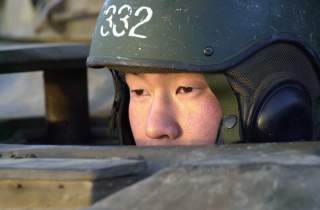South Korea to Deploy 10,000 Police to Protect Olympic Games
What is there to worry about? A lot.
South Korean police had better not plan on getting much rest during the upcoming Winter Olympics: The country will deploy 10,000 police officers, backed up with the highest technology, to protect the Games, the Korean National Police (KNP) announced on Tuesday.
Special measures are being emplaced to prevent all forms of terrorism, to handle traffic and to manage the highly anticipated visit of a large North Korean delegation, the senior police official overseeing the Winter Olympics, which take place from February 9-25, explained in a briefing to foreign reporters in Seoul.
“The success of the Games lies in the prevention of any threat of terrorism,” said Director General Kim Gyo-tae, who heads the Pyeongchang 2018 Olympic Winter Games Police Task Force. “That is the focus of our efforts.”
No threats seen, but taking no chances
“We are in coordination with global intelligence authorities, in close contact,” Kim continued. One result of this coordination is that a list of 30,000 suspects who will be prevented from entering South Korea has been drawn up.
Recommended: 5 Places World War III Could Start in 2018
Recommended: How North Korea Could Start a War
Recommended: This Is What Happens if America Nuked North Korea
However, no specific threats have yet been detected. “As of now, we have not received any information on crucial terror threats that might be executed during the Games,” Kim said.
The KNP is working with the National Intelligence Service and receiving assistance from overseas agencies.
“I don’t think I should specify a specific country, but we have received support from certain interested countries on our safety during the Games,” Kim said. “Since last year, we have conducted joint counterterrorism exercises [with certain countries], but this is classified information. “
Kim also declined to speak on which military assets would be deploying alongside his police units.
Measures are being taken against airborne, vehicleborne and cyberattacks and also against a range of weaponry, from firearms to chemical and biological agents. Regarding biological and chemical threats, the police are coordinating with the nation’s atomic-energy agency, disease-prevention centers and emergency services, Kim said.
Everything but the kitchen sink
More than 10,000 officers will be deployed on duties ranging from traffic control to counterterrorism, including “hundreds” of SWAT (Special Weapons And Tactics) and counterterrorist officers, briefers stated.
Many officers will carry specialized smartphones – “Poliphones” – loaded with apps that enable vehicle license-plate scanning, fingerprint scanning, searches for missing children, information on suspects, and emergency response.
A no-fly zone, extending to a radius of 4-5 kilometers around venues and with a ceiling of 1,200 meters, will be enforced. “Our basic stance is that there will be no drones,” Kim said. Special devices will be deployed that jam drone frequencies, and units armed with special weapons will be on hand to bring down any unmanned aerial vehicles (UAVs) that bypass these measures.
Horse-borne officers will be utilized for amicable crowd control, while quick reaction units on skis and snowmobiles will be used in the mountains.
Vehicle and pedestrian checkpoints will be established around venues, which will be equipped with X-ray machines to check incoming baggage. Police foot patrols will be constant around venues and the athletes’ village.
The police is also leveraging public support, coordinating with vehicle-rental and taxi companies. “They can alert us to anything suspicions,” Kim said. “In Korea, is it difficult to rent vans or bigger vehicles that can be used in terrorist activity.”
Smart police cars, which can scan car license plates while driving, will be used to track down stolen vehicles. Locations with steep inclines, and those where people gather to wait for buses – that is, areas that are prone to vehicle-borne attacks – will be shielded with barricades.
Thirty-nine traffic-control nodes will handle traffic in and around the Games venues in rugged Gangwon province. Traffic control will be a particularly critical task given that the Lunar New Year holiday – an annual “traffic hell” during which roads nationwide are customarily jammed – falls in the middle of the Games.
Beyond Pyeongchang itself, and the wider Gangwon province, security will also be beefed up at ports of entry, such as Incheon Airport and Busan Port.
North Korea’s participation slashes risks
With North Korea expected to attend the Games – inter-Korean negotiations on the size of the Northern team are expected on Wednesday – one potential terrorist risk may have evaporated. “Some have said this could decrease risks of terrorism,” Kim said. “But we consider all risks; we are going to remain vigilant going forward.”
In the past, North Korea has posed a deadly security risk for major sporting events in the South. In 1987, one year prior to the 1988 Seoul Summer Olympics, North Korean agents blew up a South Korean airliner in the Middle East, killing all 115 persons aboard.
And just before the last match was played by the South Korean soccer team during the 2002 Japan-Korea World Cup, North Korean gunboats attacked South Korean vessels in the Yellow Sea, killing six and wounding 19 South Korean sailors.
Special measures will be taken to ensure the security of the North Korean delegation, but there will be no North Korean security presence in the South; all measures will be taken by the South Korean police and related agencies.
“We will have a dedicated force responsible for the North Korean delegation, but the number has not been decided yet,” Kim said. “Police will provide for the safety of protesters as well.”
In the past, North Korean female cheering squads – the so-called “Army of Beauties” – have scuffled with South Korean protesters.
This first appeared in AsiaTimes here.
Image: Creative Commons.

